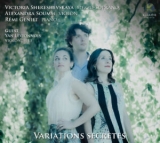Das Kunstlied auf einem ganz speziellen Exkurs, in der Besetzung für Stimme, Violine und Klavier, mit, in einem Fall, zuzüglich noch dem Cello: die aus Russland stammende, aber seit ihrem 10. Lebensjahr in Frankreich lebende Mezzosopranistin Victoria Shereshevskaya hat ein hoch interessantes und abwechslungsreiches Programm zusammengestellt, das russische, indische und französische Dichtungen und Musik zusammenbringt.
Es beginnt mit dem melancholischen Zyklus ‘4 poèmes de Rabindranath Tagore’ des Rimsky-Korsakov-Schülers Mikhaïl Ippolitov-Ivanov (1859-1935) und bekommt dann eine beschwingtere Note mit dem Menuett von Cécile Chaminade, um gleich wieder in die Melancholie zu verfallen mit Violons dans le soir von Camille Saint-Saëns, in dem Alexandra Soumm mit leidenschaftlichem Geigenspiel brilliert.
Für seinen den drei Künstlern der CD gewidmeten Zyklus Cinq Mélodies wählte der Pianist und Komponist Lucas Debargue (*1990) Gedichte von Charles de Baudelaire aus. In einem in die Blütezeit des französischen Kunstlieds zurückverweisenden Stil sind Debargues Kompositionen sehr nahe am Text, trauen der Stimme technisch so manches zu und geben dem Klavier eine wichtige Rolle.
Darauf folgt Cosmos d’Odessa des ukrainischen Komponisten Youli Galperine (1945-2019), ein im Grunde humoristisches Stück, das die russische, die ukrainische und die jiddische Sprache ebenso versmischt wie Gesang, Narration und Sprechgesang.
Shostakovichs Sieben Romanzen wurden 1967 von Galina Vishnevskaja, David Oistrach, Mstislav Rostropovich und Moïseï Weinberg uraufgeführt. In der sensiblen Gestaltung dieser Lieder auf Texte von Alexander Blok überzeugt Shereshevskaya mit makelloser Intonation und einer klugen und einfühlsamen Deutung der Texte. Sie wird von den drei Instrumentalisten ausdrucksvoll begleitet.
Das Programm endet mit einer italienischen Kanzone, Si vous l’aviez compris von Luigi Denza (1846-1922), dem Komponisten, der vor allem mit seinem Funiculì, Funiculà berümt wurde. Si vous l’aviez compris, ein Song über eine enttäuschte Liebe, wurde von Caruso und Carreras gesungen und ist hier in einer gefühlvollen Interpretation zu hören, der es freilich an italienischem Schmelz fehlt.
Uns so ist diese Produktion interessant wegen so mancher Entdeckungen (Debargue, Galperine) sowie Wiederentdeckungen, denn sogar der Shostakovich-Zyklus gehört nicht zu dessen populärsten Werken.
The art song on a very special excursion, in the instrumentation for voice, violin and piano, with, in one case, also the cello: the mezzo-soprano Victoria Shereshevskaya, originally from Russia but living in France since the age of 10, has compiled one highly interesting and varied program that brings together Russian, Indian and French poetry and music from various backgrounds..
It begins with the melancholy cycle ‘4 poèmes de Rabindranath Tagore’ by Rimsky-Korsakov student Mikhaïl Ippolitov-Ivanov (1859-1935) and then takes on a more upbeat note with the Minuet by Cécile Chaminade, only to lapse right back into melancholy with Violons dans le soir by Camille Saint-Saëns, in which Alexandra Soumm shines with passionate violin playing.
For his cycle Cinq Mélodies, dedicated to the three artists on the CD, pianist and composer Lucas Debargue (*1990) chose poems by Charles de Baudelaire. In a style that harks back to the heyday of French art song, Debargue’s compositions are very close to the text, quite challenging for the voice, and give the piano an important role.
This is followed by Cosmos d’Odessa by Ukrainian composer Youli Galperine (1945-2019), an essentially humorous piece that mixes Russian, Ukrainian and Yiddish languages as well as singing, narration and chanting.
Shostakovich’s Seven Romances were premiered in 1967 by Galina Vishnevskaya, David Oistrakh, Mstislav Rostropovich, and Moïseï Weinberg. In her sensitive performance of these songs on texts by Alexander Blok, Shereshevskaya is convincing with flawless intonation and a refined interpretation of the texts. She is accompanied expressively by the three instrumentalists.
The program ends with an Italian canzone, Si vous l’aviez compris by Luigi Denza (1846-1922), the composer most famous for his Funiculì, Funiculà. Si vous l’aviez compris, a song about a disappointed love, was sung by Caruso and Carreras and is heard here in a soulful interpretation that admittedly lacks Italianate gusto.
So this production is interesting because of some discoveries (Debargue, Galperine) as well as rediscoveries, because even the Shostakovich cycle is not one of his most popular works.






















